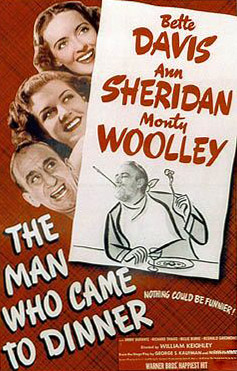The
Man Who Came to Dinner (1942)
Directed by William Keighley
Screenplay by Julius J. Epstein and
Philip G. Epstein, based on the stage play by George S. Kaufman and Moss Hart
Runtime: 1 hr, 52 min
In
real life, the sort of person who we brand as “politically incorrect” (in mild
terms) would be completely insufferable (to put it charitably) and deserve
nothing less than a baseball bat to the head (metaphorically speaking). Yet when put on stage or on screen, this
particular breed of jerk is hilarious, shocking the audience into laughter with
his wit, rather than to wit’s end with his feeble attempts at humor. The 1942 film adaptation of The Man Who Came to Dinner is a perfect
example of misanthropy as comedic genius.
Famed
lecturer and radio personality Sheridan Whiteside (Monty Woolley) comes to the
home of the Stanleys, a well-to-do Ohio family, for dinner. However, on his way up the stairs, he slips
on a patch of ice and appears to break his hip, forcing him to stay with the
family for weeks on end. He then
proceeds to make life Hell for his hosts, making ridiculous demands at the
threat of massive lawsuit. Meanwhile,
much to his dismay, his secretary Maggie (Bette Davis) falls in love with local
newspaperman and aspiring playwright Bert (Richard Travis). Hilarity ensues.
The
center—I’d call it the heart, but that’s a terrible analogy—is obviously
Whiteside, who is an unrepentantly horrible person, only redeemable by his
intellect and way with words. He demeans
his nurse (Mary Wickes) a constant basis, scares the Stanley family out of
their minds with his behavior, and has the gall to invite the murderers he has
previously profiled over for dinner without the family’s knowing. And through it all, Woolley’s performance is
a riot, cracking jokes with a smirk so transparently false it raises the humor
factor exponentially.
Of
course, Woolley isn’t pulling the film by himself. Well, actually, he is, but that the script’s
fault. The supporting cast members,
while lacking the lead’s screen time, turn in outstanding performances as
well. Ruth Vivian is a nuanced sort of
crazy as the Mr. Stanley’s strange sister Harriet, while Jimmy Durante pulls
off the wacky obnoxiousness of Whiteside Hollywood actor friend Banjo. The Man
Who Came to Dinner boasts such a wide array of characters that to do all of
them justice would take up the entirety of this article.
In
addition, what makes the film laugh out loud hilarious is the patently absurd
developments. This is exactly the sort
of Universe where a lecturer hosts a party of Chinese diplomats, fresh from the
White House, as a world-renowned naturalist sends him an octopus as a
present. This is the sort of Universe
where the small-town doctor (George Barbier) can write a memoir of his
forty-year practice and try haplessly, for weeks, to get the lecturer to
actually read it, while someone gets trapped in a sarcophagus. It quickly becomes a live action cartoon, and
the laughs just keep coming. Only when
Whiteside is around can such a bizarre, funny Universe exist.
Yet
Whiteside’s self-centeredness and blatant disregard for decorum is what also
what makes him so eminently detestable.
The thought of his trusted secretary quitting and marrying a
Midwesterner of all people drives him to some terrible actions. When Maggie gives him the play Bert’s been
working on, Bert hatches a plan to break them up. He calls up his seductive actress-belle
Lorraine (Ann Sheridan) and asks her to “play the part” by seducing Bert. It’s a plan which blows up in his face, and despite
the repercussions, it’s one he shows little visible remorse for.
It
doesn’t hurt that the relationship he wants to destroy is conveyed so
beautifully. Even though the smoky Bette
Davis and the “aw, shucks” charm of Richard Travis would seem to occupy two
mutually exclusive sets, their scenes together, spent ice-skating and enjoy hot
sweet potatoes, develop a very believable romance. I would believe that Maggie would spend her
energy trying to get his play to Whiteside, and being so brokenhearted when she
finds out what her boss has been up to.
It’s hard to think of two lovebirds that deserve Whiteside’s selfish
behavior less.
Of
course, The Man Who Came to Dinner has
its problems, particularly with regards to initial believability. I would get Mrs. Stanley (Billie Burke) would
be so honored to have such an illustrious intellect as Whiteside for dinner,
but the way that Whiteside behaves, it’s a miracle that, hip injury or no,
someone doesn’t immediately have him forcibly removed. The film’s premise, like everything else in
the picture, bears no resemblance to reality, but being the set up, it’s a bit
harder to swallow than the rest.
Ridiculous
setup aside, The Man Who Came to Dinner
is movie well worth seeking out. I have
rarely laughed so loudly or so frequently; it’s right up there with Singin’ in the Rain in terms of sheer
hilarity. As long as the remorselessly,
proudly unsympathetic comedy protagonist is not an immediate dealbreaker—and,
admittedly, Woolley’s character is an especially unsympathetic one to
swallow—then I can all but guarantee that you will find this movie a riot as
well. And remember: always be sure to
salt your stairs, lest this man show up for dinner.

No comments:
Post a Comment